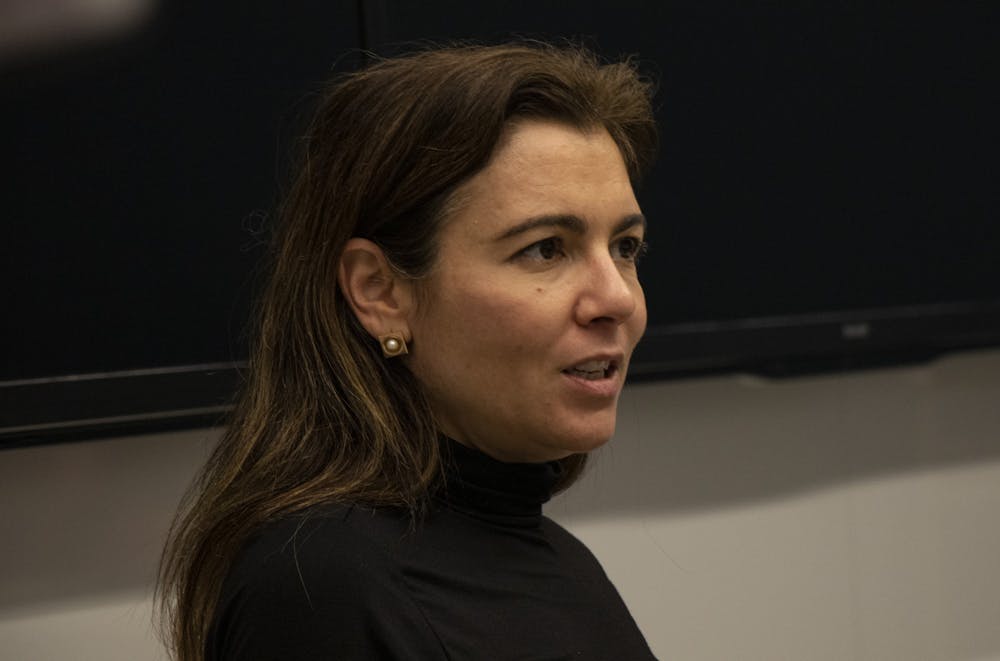A conference organized by IU's Portuguese department and the Brazilian Literary Spring, an international and annual collaboration, took place Monday and Tuesday at IU.
Leonardo Tonus, an adjunct professor of Brazilian Studies at Paris-Sorbonne University and founder of the Brazilian Literary Spring, was a guest at the IU seminar.
The Brazilian Literary Spring was started in 2014 after Tonus invited several Brazilian writers to teach contemporary Brazilian literature to his classes. Tonus decided he would form a group of Brazilian writers that would travel to other universities and speak on the importance of Brazilian literature.
Three years ago, he expanded visits to American universities. He now travels with different authors from the project throughout various countries to enlighten students on Brazilian literature, which was the purpose for his visit to IU.
This was the second Brazilian Literary Spring panel at IU. Of the 75 current members of the project, two of them, Débora Thomé and Martha Batalha, came to IU to participate in seven events on Brazilian writing, art and politics.
The theme of this year's collaboration was "impossible, possible dialogues."
Monday's events began with a roundtable discussion featuring Tonus, Thomé and Batalha deliberating on the impact of Brazilian politics on art.
Tuesday's events included discussions of topics such as the work of Brazilian visual artist Ícaro Lira and a poetry workshop for graduate students. Each were taught in Portuguese.
Thomé said it’s important to talk with students because it helps to break the barrier between writers and readers.
“You have this idea that the writer is more special than you when you’re just a reader,” Thomé said. “You have this idea that the writer is a god.”
Thomé said she was happy to visit IU’s Portuguese department again, as she did last year. She taught a class Monday morning called “Children's literature and the topic of LGBTQ+” about the book she is writing.
“I think it’s a very alive department,” Thomé said. “There’s a lot of things going on and the students are very interested in knowing more about the contemporary literature in Brazil.”
Batalha began her career as a journalist in Brazil. Since then, she has published two novels, “The Invisible Life of Euridice Gusmao” in 2016 and “The Castles of Ipanema” in 2018. She discussed her works in a lecture on Monday and is writing her third novel.
“We have such a lonely job,” Batalha said. “It’s such a privilege to be here, and I think it’s very good for all the authors taking part to be exchanging ideas.”
Batalha’s first novel was adapted into a film titled “An Invisible Life." The film, directed by Karim Aïnouz, was shown at the 2019 Cannes Film Festival and chosen as Brazil’s selection for the Oscar’s Best International Feature Film category this year.
However, Batalha said she believes the film has faced screening obstacles under Brazil's right-wing government. IndieWire reported that a screening planned for employees of the National Film Agency was suddenly canceled and never rescheduled in Brazil.
“I started to read fiction like crazy after the current government took over,” Thomé said. “This last year I read a lot because I could not read the news.”
Portuguese Program Director Luciana Namorato said she believed the political difficulties some authors experienced in Brazil influenced the topics they chose to discuss at many of the panels.
"It's important to think about the political context too," Namorato said. "I think there's a renewed sense of responsibility for the writers."
Each of the authors covers different areas of literature, allowing them to contribute to an understanding of Brazilian literature as a whole.
“I feel like we are looking at the same picture,” Thomé said. “But we are looking at it from different glasses.”
In addition, they also spoke in-depth Monday morning on the ability literature has to spark activism and political motivation.
Following his IU visit, Tonus will travel with other authors to various European countries to continue advocating for Brazilian writing. He hopes the Literary Spring will be able influence the students he meets much like his own.
“I tell my students all the time ‘You can forget my classes, but never forget my passion for literature,'” Tonus said.






